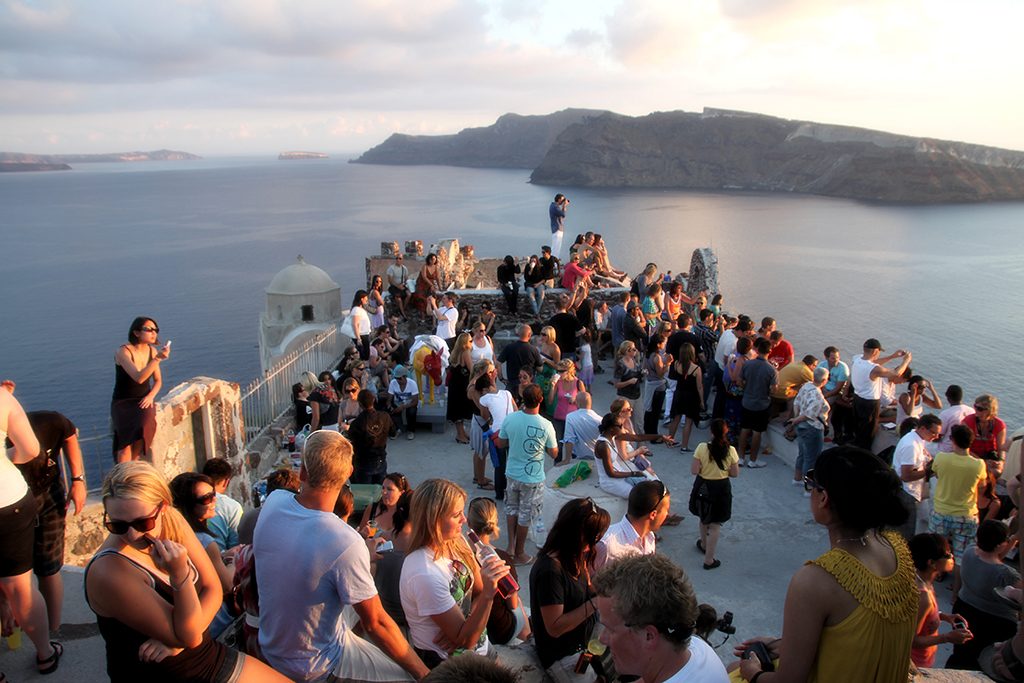Rhodes &Santorini
Pilot Destination
Management Plans
An initiative that focused on the challenges of tourism development in two of the country’s top destinations, with a view to increasing positive impacts on the tourism sector and local communities.
The European Bank for Reconstruction and Development (EBRD) implemented the pilot programme from May to October 2019 in cooperation with the Hellenic Ministry of Tourism and the Chambers of Commerce of the Cyclades and Dodecanese, with funding from the European Union.
THE PROJECT
Project Milestones
-
TRAVEL TRENDS AND TOURISM RESEARCH DATA
-
WORKING MEETINGS AND WORKSHOPS AT DESTINATIONS
-
TARGETED INTERVIEWS AND ONLINE QUESTIONNAIRES
-
FINAL REPORTS AND PRESENTATIONS
Improving the qualitative characteristics of Greek tourism is a consistent goal inherent to the principles of sustainable development and efforts to constantly enrich the tourism product.
The matter of continuing tourism development on sustainable terms requires the creation and implementation of integrated long-term strategies that offer scope for application in both popular and less developed destinations and are focused on the needs of those involved in shaping the tourism product (visitors, businesses, local communities, etc.).
For the European Bank for Reconstruction and Development (EBRD), the pilot project and its milestones constitute an important opportunity for all domestic destinations, provided that stakeholders seek to reinforce their adaptability and responsiveness to existing and future challenges of tourism development.
TIMELINE
The phases of the programme
The pilot project comprised five distinct yet interlinked phases, the implementation of which was being undertaken by a consortium of consultants from the United Kingdom and Greece.
In May 2019, the tourism research phase began with the first round of exploratory contacts with local bodies in Rhodes and Santorini. The Situation Analysis, finalised in June, summarised the main findings of these activities based on the following indicative modules:
- Review of the latest trends shaping the framework of tourism development in the two destinations
- Mapping of local bodies
- Analysis of tourism supply and demand for each destination
- Initial evaluation of the destination’s tourism products and experiences in relation to the characteristics of target markets
- Review of existing destination management practices in the two destinations
- Review of good destination management practices from within Greece and abroad etc.
Public consultation took place on the basis of a wide range of actions (e.g., working meetings and workshops with interactive modules, online questionnaires, interviews, site visits to popular attractions), offering local authorities, the business community and representatives of other social groups to have their say on various issues. Some of the questions that determined the content of the public consultation are as follows:
- What is the vision for tourism development in Rhodes and Santorini through 2025?
- What characteristics need to be further highlighted in order to develop experiential travel activities, upgrade the destination’s identity and attract appropriate target markets?
- What are the main needs of the two destinations
- What issues need to be resolved in order to maximise the economic, social and environmental benefits of tourism development?
- How should the management and promotion of destinations be organised in the long term, and what partnerships can make a more substantial contribution in this direction?
The completion of the public consultation marked the start of the drafting of the destination management plans, with all of the research findings to hand. The structure and modules of the plans is based on good practices from abroad as well as the guidelines of international experts collaborating with the consortium of consultants on the project.
Once proceedings were completed, destination management plans for Rhodes and Santorini were submitted along with a destination management planning guide for the development of similar plans for other destinations in Greece.
The draft plans were presented in meetings with local bodies with a view to gathering comments and observations. This stage was vital as it provided further impetus for public debate. It also contributed to the convergence of stakeholders on key strategic directions.
All stakeholders who actively supported the implementation of the pilot project, namely the European Bank for Reconstruction and Development (EBRD), the Ministry of Tourism and the Chambers of Commerce of the Cyclades and Dodecanese, played a key role through their observations during this stage.
The two Destination Management Plans were presented to the local communities of Rhodes and Santorini at the end of October. Furthermore, the guide to destination management planning was presented in Chania (Crete) and Athens on October 30-31.
NEWS & ANNOUNCEMENTS
Stay up-to-date with current project

Introduction
This blog outlines the challenges facing Santorini and Rhodes as tourism destinations and the steps that are being taken to underpin a sustainable, long-term future for the islands through effective destination management planning, under the auspices of the European Bank for Reconstruction and Development. It also provides a timescale for the actions proposed and explains how stakeholders can participate in shaping the islands’ future. Additionally, it addresses how destination management planning might be extended throughout Greece.
The Challenge
Tourism is an important driver of the Greek economy, representing 19% of the national economy and considerably more in Greece’s many islands. While the average length of stay is shortening, visitor numbers and revenue have continued to grow. However, as tourism increases worldwide, it is becoming increasingly important to ensure visitors’ contribution to the destinations that host them remains positive, in economic, social, and environmental terms. This is particularly true for destinations such as Santorini and Rhodes, whose economy and residents’ livelihoods are inextricably linked with visitors to the islands.
To this end, the EBRD with the support of the Greek Ministry of Tourism and the Chambers of Commerce of Dodecanese and Cyclades has called for the development of sustainable destination management plans for Santorini and Rhodes. Funded by the European Union, and following an open tender process, a consortium of globally experienced tourism consultants, comprising Greek company Toposophy and UK companies TEAM Tourism Consulting and Yellow Railroad Limited, has been appointed to undertake this work.
Their initial task will be to work with stakeholders in Santorini and Rhodes to develop destination management plans (DMPs), which will identify a way forward for the islands’ tourism and underpin their future prosperity, in a way that is economically, socially and environmentally sustainable. They will also prepare a guide as a basis for extending the application of destination management planning to destinations throughout Greece.
Activities and Results:
In order to address these challenges successfully, the project’s focus will be on achieving the following results:
Santorini and Rhodes:
- Development of sustainable destination management plans for Santorini and Rhodes:
- to underpin sustainable, long-term tourism growth for the islands;
- Ownership of these plans by stakeholders in Santorini and Rhodes:
- through participative engagement of stakeholders throughout the process and concluding with a presentation of the final version to stakeholders on each island;
- Local implementation bodies established:
- to implement the DMPs on each island and monitor their success.
National Level:
- Preparation of a guide to developing destination management plans for destinations elsewhere in Greece:
- to help destinations throughout Greece to develop their own sustainable destination management plans;
- Workshops with stakeholders in Athens and other destinations in Greece
- to help destinations understand the principles and mechanics of destination management planning and inspire them to develop DMPs for their own areas.
Timescale – Major Milestones
(N.B. All dates beyond July are provisional, subject to confirmation as the project progresses)
- Inception meetings – (May – completed):
- to define project scope and approach, key targets, milestones, timing, project management issues, and resource implications.
- Stakeholder consultative workshops – (June – completed):
- to work with stakeholders to: identify stakeholder aspirations and concerns; refine the vision; explore current strengths, weaknesses, opportunities, threats and market priorities; review the island’s competitive positioning; identify product, experience, infrastructure and skills gaps and any negative impacts from tourism; identify performance measures.
- Community fora – (June – September):
- to engage communities in the islands, hear their aspirations, ideas for tourism in their islands, and their concerns, and inform them of the DMP development process.
- Destinations’ reviews: – (June – completed):
- to build a picture of each island’s major visitor products, experiences, and visitor-related infrastructure, plus any skills gaps and any negative impacts from tourism
- Research (surveys) and draft plan development (July-August):
- to obtain further data and insights on visitor behavior and perceptions, community perspectives, and tourism industry views.
- DMP development workshops with stakeholders – (September):
- to discuss and agree on the strategic priorities to be included in the plans with island stakeholders, based on data and insights garnered from research, and international best practice.
- DMPs finalised for Santorini and Rhodes following a final review by local stakeholders in September (mid-Oct).
- Guide to destination management planning for Greece finalised following a final review in September by national-level stakeholders (mid-Oct).
- Workshops on DMP – Athens and other destinations (to be decided) (Oct):
- to encourage other destinations in Greece to develop destination management plans for their areas and to provide them with the tools, in terms of guidance, on how to do so.
How You Can Get Involved
The DMPs for Santorini and Rhodes will be effective only if island stakeholders have helped design them through active participation in their development. We therefore value and encourage comments from all stakeholders, which is why this project is underpinned by a highly consultative process.
A dedicated website will be the main channel for interactive communication for all island stakeholders throughout this project. The main uses of this website and opportunities for stakeholders to get involved will be:
- To keep stakeholders updated on the project’s progress;
- To publish draft DMPs, for stakeholders to comment;
- To seek feedback from stakeholders on specific issues.
It will therefore be important for those wishing to contribute to the development of the DMPs for Santorini and Rhodes to keep an eye on this website for opportunities to input their views. The timescale above provides an indicative timeline, which outlines the main stages at which stakeholders will have an opportunity to input their views (e.g. community fora, draft DMP stage). Any changes to these dates will be published on this website.
CLOSE


The EBRD is teaming up with the authorities in Greece to roll out a programme to promote sustainable tourism in two of the country’s most popular holiday islands – Rhodes and Santorini.
The European-Union-funded destination management planning initiative aims to help the island’s businesses and local communities develop responses to the challenges of tourism, including diversifying destinations, reducing the dependence on “Sun and Beach” model and combatting the threat of “over-tourism”.
The initial focus is on Rhodes and Santorini where the programme is supported by the Chambers of Commerce of Dodecanese and Cyclades. The programme is broadened by the development of a destination management guide for the preparation of similar plans in other destinations around Greece.
The plans will highlight the benefits and the challenges of tourism development and will provide a long-term strategy for each of the island destinations, identifying the necessary initiatives to continue tourism on sustainable terms and defining the roles of different stakeholders. In addition, a training guide will lay the foundations for extending relevant practices around the country.
The aim is to ensure that the destinations are developed, managed and promoted successfully, in a sustainable, long term, integrated way, with a clear focus on the needs not only of tourists but of businesses and residents as well.
The EBRD has been investing in Greece since 2015 to support the country’s economic recovery. Since the beginning of its operations, the Bank has invested over €2.7 billion in the country.
CLOSE


